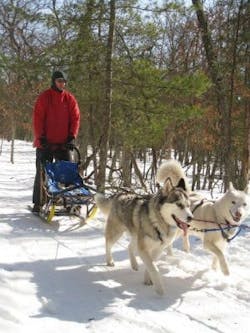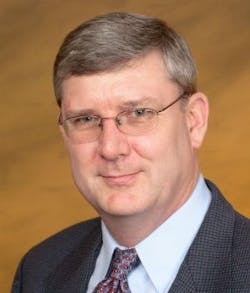2019 Control Process Automation Hall of Fame: Nicholas Sands
Nicholas Sands likes to find the time to pack up his huskies and go dogsledding. Here he is around 2010, on one of many trips in a national forest near Baldwin, Mich., with Homer and Molly.
Credentials
- Fellow, International Society of Automation, 2012
- PE, Licensed Professional Engineer in the state of Delaware, 2009
- CAP, Certified Automation Professional, 2004
Awards
- ISA Standards Excellence Award, 2017
- DuPont Automation & Process Control Excellence Award, 2010, Alarm Management
- DuPont Automation & Process Control Excellence Award, 2008, Quick Start
- DuPont Titanium Technologies Engineering Excellence Award, 2003, Iron Chloride Storage Project
Standards work
- ANSI TAG SC65 Deputy Technical Advisor, 2017-present
- Chair, Technical Assembly, 2017-2018
- Vice president, Standards and Practices Department, 2015-2016
- Co-director of ISA85 Safety Instrumented System committee, 2016-present
- Co-chair of ISA18 Instrument Signals and Alarms committee, 2003-present
- Secretary of IEC 62682 (IEC TC65/SC65A/WG15) Management of Alarm Systems, 2010-present
- Lead editor of ANSI/ISA-18.02 Management of Alarm Systems for the Process Industries, 2003-2009, 2014-2016
- Member, ANSI TAG SC65A Industrial-Process Measurement, Control and Automation, System Aspects, 2010-present
- ISA Executive Board member, 2010-2011, 2015
- Member, ISA standards committees including ISA84, ISA100, ISA101, ISA105, ISA106, ISA108
Both were also enthusiastically nominated and selected by the existing members of our Process Automation Hall of Fame. And, as you’ll see, each presents an admirable example of how one person can influence and inspire others to strive and excel in the field.
Bears standards, promulgates best practices
Our first 2019 inductee is Nicholas Sands, senior manufacturing technology fellow, global alarm management leader, and process control engineer, DuPont Safety and Construction. Graduated in 1990 from Virginia Tech with a BS in ChE, Sands has leveraged his 29-year career at DuPont into a position where he has dual roles as a process control engineer and as a resource both within and outside DuPont for safety standards development and training.
“Like many of my colleagues, my path to process automation began by accident,” Sands says. “As a chemical engineering student at Virginia Tech, I landed a co-op job at Tennessee Eastman in Kingsport. The co-op program was amazing, with dozens of tracks and a selection of assignments that amounted to a mini-career path. My first job was in manufacturing information systems, and I quickly learned that chemical plants were operated through computer systems. I was hooked.”
“When I finally graduated in 1990, I only considered automation jobs, and it’s been only automation jobs since then.”
Sands hired into DuPont’s field engineering program, which offered different assignments at different locations. “That provided the opportunity to work on automation projects in different plants and processes for the first few years, including Victoria, Texas and Wilmington, North Carolina,” he says. “The next assignment was in Engineering in Wilmington as a consultant, providing the opportunity to do plant start-ups in Taiwan, China and South Carolina.”
In 1999, Sands started taking on leadership roles. “The first was a mixed engineer and manager role with responsibility for the site automation systems, technicians, and engineers,” he says. “The second was as a process control leader for a business with a dozen sites and manager of the automation technicians and engineers that supported many of the sites.”
As Strategic Business Unit process control leader and Process Control Technology Center manager, Sands had supervisory responsibilities for technologists and engineers, and technical responsibility for control systems, safety systems and data historians, as well as security of those systems across the 18 sites of the enterprise. The role included liaison between IT and process control, leading the competency team of the Automation & Process Control Center of Competency, and developing the process control competency assessment process.
Extends his influence
Sands’ work inside DuPont has changed over the years, from control strategies to configuration and commissioning practices, to alarms and safety systems, but always with a focus on development and sharing knowledge.
“In my first years with DuPont, I needed to find a way to coordinate multiple PID controllers,” Sands says. “I found a way of manipulating the output limits that worked to limit control to one direction of the output. This technique allowed several new strategies for optimization that were simple to implement. I wrote an internal company paper on the technique, which a colleague submitted to an ISA conference in Los Angeles, and eventually won an award. It was a great experience and encouraged me to work outside my company as well as inside.”
“In 2003, Donald and I became co-chairs of the ISA18 committee that produced, with the help of dozens of experts, the first global standard on alarm management, ANSI/ISA-18.2 in 2009. Together, we led the IEC committee that produced a modified version, IEC 62682. It's been an amazing experience to work with so many people in so many different industries from so many different countries.
“Mostly through ISA, and with the help of many of the members of the Process Automation Hall of Fame, especially Vernon Trevathan and Ian Verhappen, I worked on the Certified Automation Professional (CAP) program, the Guide to the Automation Body of Knowledge, 3rd Edition, and training courses similar to the introduction to automation course I lead at DuPont.” Along with transferring knowledge from DuPont, Sands says there are many cases where he brought outside knowledge in to improve DuPont’s own best practices.
Always an engineer
In 2008, Sands wanted a break from managing people, and wrote a job description for a role that was 80% projects and 20% standards and training. “I kept a log of all the things I did, and found I enjoyed process control and training, but not management. I wrote a job description, sent it to the unit managers, and they said 'yes, we want that,' ” he says. “My time is divided 80/20 between project engineering work and standards development/training. The 20% on standards has a long-term payback, but it’s the things I want to do—to worry about the future and to develop people.
“I've been lucky to have the opportunity work on the automation and safety and develop new best practices and standards. I’m really just a control engineer, going from one job to the next, using the standards, working on best practices and doing training. As I go, I develop new practices, update the old ones and train others. It keeps me grounded."
Read more about the other 2019 honoree, Carlos A. Smith




